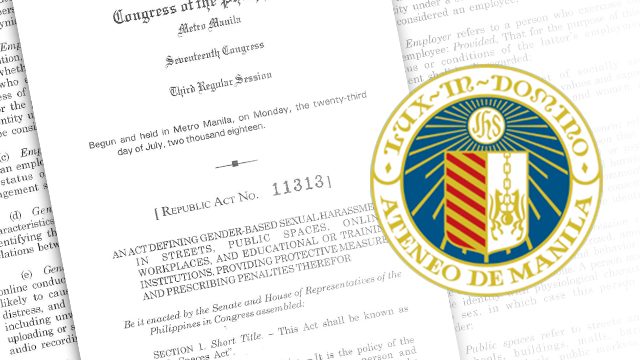SUMMARY
This is AI generated summarization, which may have errors. For context, always refer to the full article.

MANILA, Philippines – The Ateneo de Manila University wants the implementing rules and regulations (IRR) of the Safe Spaces Act or Republic Act (RA) 11313 to be specific about the duties of schools in resolving cases of gender-based sexual harassment.
Provisions on administrative due process should be included, Ateneo legal counsel Patty Arroyo said during the final public consultation on the proposed IRR on Monday, October 14, in Quezon City.
Ateneo has been criticized for the supposed “lack” of updates on reports about several professors who allegedly committed sexual harassment.
Student council President Quiel Quiwa told Rappler that even they are in the dark when it comes to the status of investigations. The university administration does not disclose details of cases in line with the Data Privacy Act.
Under the Safe Spaces Act, schools are duty-bearers who are tasked not only to investigate sexual harassment incidents, but also create efforts toward prevention and education.
If schools fail to act on reported acts of gender-based sexual harassment committed within the institution, then they are deemed liable. However, the law still provides that schools have the duty to observe due process during investigation and guarantee confidentiality “to the greatest extent.”
The IRR’s target signing is on October 28.
‘Unreasonable expectations’
Arroyo said that there is a lack of clarity in the duties of schools in resolving cases. She cited anonymous online reports with no accompanying formal cases, for instance.
The Safe Spaces Act says that if the school has knowledge of possible abuse, then it must “take appropriate steps to resolve the situation.”
Reporting alleged predators anonymously on an online freedom wall has been a trend in the university. The school administration has since then called on students to file formal complaints instead because the school cannot act on unofficial, anonymous reports on informal platforms.
Arroyo said the vague wording of “resolving the situation” creates “unreasonable expectations” on the school, as she said they are currently experiencing.
“So in this era, where people are prone to just posting anonymous complaints online on social media, without much detail as to who, what, where, when, and then they come to school and see a teacher, and they ask why that teacher is not terminated, they ask, ‘Why didn’t you resolve the situation?’ An unreasonable expectation is created by that vague term,” said Arroyo.
“So perhaps put there, subject to the requirements of administrative due process, subject to the availability of independent direct evidence, to prove offense. Because what is happening also is some people are convicted before they are heard, because people refuse to come with a formal complaint and would rather just go to social media, which is all so unfair,” she added.
IRR consultant lawyer Gettie Sandoval responded by saying the Commission on Higher Education had participated in previous consultations. She also responded mostly to Arroyo’s other concern on the law’s provision of only 10 days to investigate and decide on a case, saying the IRR cannot change the number of days, even though in previous consultations many have complained about it.
In the public consultation, breakout sessions were conducted on the implementation of the law in public and online spaces, workplaces, and academic and training institutions.
In the summary of discussion presented by the academic institutions group, there was no further mention of the recommendation from Ateneo.
Instead, the academic and training institutions focused more on including provisions specifically catered to groups like persons-with-disabilities, clarifying the definition of a child, and “harmonizing” the law and existing policies of schools on sexual harassment.
What’s in the law?
Educational institutions, under the Safe Spaces Act, are compelled to address hostile environments caused by just “reasonable knowledge” of someone committing gender-based sexual harassment or sexual violence.
Investigation must also be carried out “even if an individual does not want to file a complaint” or does not request the school to take any action.
The law states: “If a school knows or reasonably should know about acts of gender-based sexual harassment being committed that creates a hostile environment, the school must take immediate action to eliminate the same acts, prevent their recurrence, and address their effects.” – Rappler.com
Add a comment
How does this make you feel?
There are no comments yet. Add your comment to start the conversation.